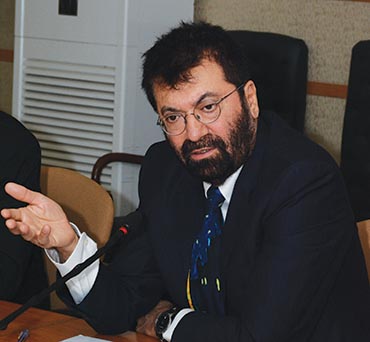
Editor, Narratives

Without issuing any charges, the federal government dismissed Dr. Tariq Banuri from the chairmanship of the Higher Education Commission (HEC) in March 2021 by changing the Higher Education Ordinance 2002 to lower the chairman’s tenure from four to two years. The HEC is intended to be an autonomous body with the fixed term of the chairman. While the legislation mentioned COVID-19 and the knowledge economy, it did not introduce regulatory guidelines for online education, digital libraries, or students’ internet access, and computers.
Q: First of all, you critiqued the higher education institutions of Pakistan, terming them ‘degree mills’ in the last column you wrote for Narratives. What do you mean by degree mills?
Dr. Banuri: A degree is a piece of paper. When I look at that piece of paper, it either tells me something, or it doesn’t tell me anything. If it’s a proper degree, it tells me that this person who has this degree has some competence. There are things that they know; there are things that they can do; they have some professional attributes that they have picked up from going to a good institution. They have interpersonal characteristics and can work with others. So if somebody has a degree from a good university, let’s say NUST, I can assume some academic and interpersonal skills.
On the other hand, you can get a degree from either a weak institution or an institution engaged in, let’s say, unacceptable activities. My honest view is that it doesn’t tell you anything most of the time. Degree holders could be good people, probably not genius, because they would not go to such an institution. Or it could be somebody who doesn’t know anything. So you see, you have two degrees, one degree gives me some information. And the other degree gives me no information whatsoever. It could be a random person off the street, who I look at, and I have no idea what they can do or not do etc. So if you start giving degrees of the second type, you’re neither helping your students nor helping the country as a whole by providing the skills, expertise, and knowledge that the country needs.
The second one is easier to do. Universities announce they are open for admissions and keep on lowering the standard to increase enrolment. And at the end of a particular period, they hand out a piece of paper. Basically, they throw ‘graduates’ into the market. Now in Pakistan, beginning around 2002, under the HEC, universities were made to believe that they could issue degrees indiscriminately. The more graduates you produce, the better you are, the more students you can admit, the better you are. The larger the number of degrees with all kinds of exotic names, the better you are. The degrees from most of those places are totally useless.
I sit on recruitment boards and selection boards. I can tell you that there is no point in looking at a large number of degrees because they just don’t give you any information whatsoever. Students might as well not have that piece of information. In fact, let me say the following. Suppose I get a CV of a person who has studied entirely in Pakistan. So if somebody has a degree from UET Lahore, NED University, or UET Peshawar, I basically feel that this person can be relied on to do some good work. Some of the new institutions in the nonprofit sector have worked very hard to establish the quality of their degrees such as LUMS, Habib, Aga Khan University, to a lesser extent, GIK Institute, not comparable to LUMS. Depending on the department, Punjab University students probably struggled to get in and, therefore, have decent potential. But many of the other universities, actually, might be getting good students. They might be given a good education, but universities really don’t maintain consistent quality standards. It doesn’t tell me anything. So I might just ignore that altogether and look at the person afresh. Right? So if the degree doesn’t give me information, it’s just a piece of paper. If you give me 100 rupee notes, I know that people will accept it and provide me with something in return if I go to the shop. If I don’t know it, there’s just a piece of paper in my hand. Right? So many universities have become this, and we need to rescue them.

Q: You mentioned less than 10 names out of 211+ universities in Pakistan. And that’s very unfortunate because all those 211 plus universities have a seal of approval from the HEC. And as chairman of HEC, you’re telling me that it has done an abysmal job of accrediting universities. Are you ranking universities based on their intake? If a university has a higher intake standard, our assumption is that it will be a better university?
Dr. Banuri: I have to explain this, see again to simplify matters greatly. Suppose I am trying to assess something, I will look for a consistent quality pattern. It gives me a very different impression if I find either inconsistent or poor quality. The higher the institution’s quality, the more careful they are in trying to find the best possible students, so they can invest in them. The second one is the integrity of their evaluation systems. Universities are a significant part of what is called a social evaluation process. We academics spend 90 percent of our time in evaluation. What I mean is, I have to look at students and say did they pass? I have to look at people who send me papers for review; I see whether they’re good or bad. I have to look at grant proposals. I mean, that’s all we do; we evaluate people. So evaluation is a very central part of it. Suppose you have a system in which everybody who comes in, ends up graduating regardless of their quality. In that case, you can tell that it’s a poor quality institution or a poor quality degree, right? And some of our degrees, particularly our PhD degree, fall into that category. Anybody who gets admitted gets through regardless of the quality.
The third one, of course, is what happens in the middle? Did you actually invest in them? Or did you just say, well, you spent four years here and then come back and get your degree? Does a university have an excellent mentoring system, good infrastructure, libraries? Do they inspire and motivate students to use digital resources effectively. So it’s not only the entrance. It’s a whole process. Ultimately what I’m saying is, if the university doesn’t try to invest to protect its quality, then very quickly, it just becomes a piece of paper. Right? And for many universities, their degrees have become just pieces of paper.

Q: As a parent, when I see the seal of approval of the HEC, it means I have to invest 10 lakh rupees of my savings on my child’s education. The degree paper that they’re walking out with, will be worth something. Still, you’re telling me that it is just a piece of paper?
Dr. Banuri: Traditionally, it has been that way and is one of the challenges that I have confronted. And this is one of the reasons why the unfortunate incidents of March 2021 took place; one of the challenges that I’ve had is to turn that engine around and get people to start focusing on quality. But we have set up an intricate structure that is highly resilient to intervention in order to move forward. This means that you know once you have a particular pattern of functioning, you have several people who are told that to be successful, this is what you have to do. And ‘this is what you have to do’ has nothing to do with the quality of education you provide, well then that’s what they will do. And so you have a huge cohort of people who actually think that this is the right way to behave and have no concern whatsoever with the output. So, for the last few years, I’ve been fighting a battle with all of these institutions and especially their leadership to turn that ship around. Therefore, my job is to get the universities to engage with this issue in the first place, become conscious of quality, and focus on the different things they can do to protect and uphold quality. That’s a struggle that we’re going through — the regulatory part of the HEC. I would probably say that it’s the first time that we have tried to use it in 20 years. In the past, the HEC did not use it but just set absolutely minimum standards. And then paid no attention to it. The only reason the HEC would give attention to it after many years, was to harass somebody; if I don’t like your face, and I have given you the approval, I will find two or three things that you’re doing wrong and come and start harassing. That is what the institution was good for. I didn’t want that; what I wanted is that you and I have a partnership, say we are going to build a first-class university; I was going to say world-class, but maybe not a first-class university. And I will do my part, and you will do your part. And on that basis, my regulations will, on the one hand, provide you with the guidance and the framework that you need, and on the other hand, provide you with the freedom. That’s the direction in which it’s not been an easy task and will take some time; I think what has happened now, if I may sorry just take one last thing, is that the unfortunate incidents of the last one year, because of the prominence that some of these issues received including the coverage that you provided to it have now come into a kind of public discourse. I’ve been greatly encouraged by the response of the younger faculty members, who have been writing to me in the thousands. I mean, you know hundreds leading up to the thousands basically saying: This is what we want to do, but the framework is such that we just can’t find a way of moving ahead with it. And hence, I’ve been trying to work with those people to try and help them to come out. And now ultimately, if you look at this kind of awareness, this knowledge that this thing, this way of doing things is wrong, and that things have to be done differently; this knowledge is the one that is going to transform the universities. The HEC will play its role, both in inspiring and providing a framework as well as in providing freedom. But the energy really has to come from the universities. And that’s the direction in which we are going.
Q: In your previous response, you were particularly concerned about the quality of PhDs in Pakistan. Can you elaborate?
Dr. Banuri: The PhD degree has, unfortunately, become a joke. It’s such a serious problem. We conducted an exercise to assess gaps in the education of some fresh PhDs. 534 PhD students participated. And the results were horrifying. Because we found that essential skills, essential professional behaviours, essential knowledge were missing. And so my task, my response to this, was to set up remedial systems to fill those gaps. And I still believe that there are constructive ways in which we can move forward. There are some people who recognize their own deficiencies and subvert the whole system.



